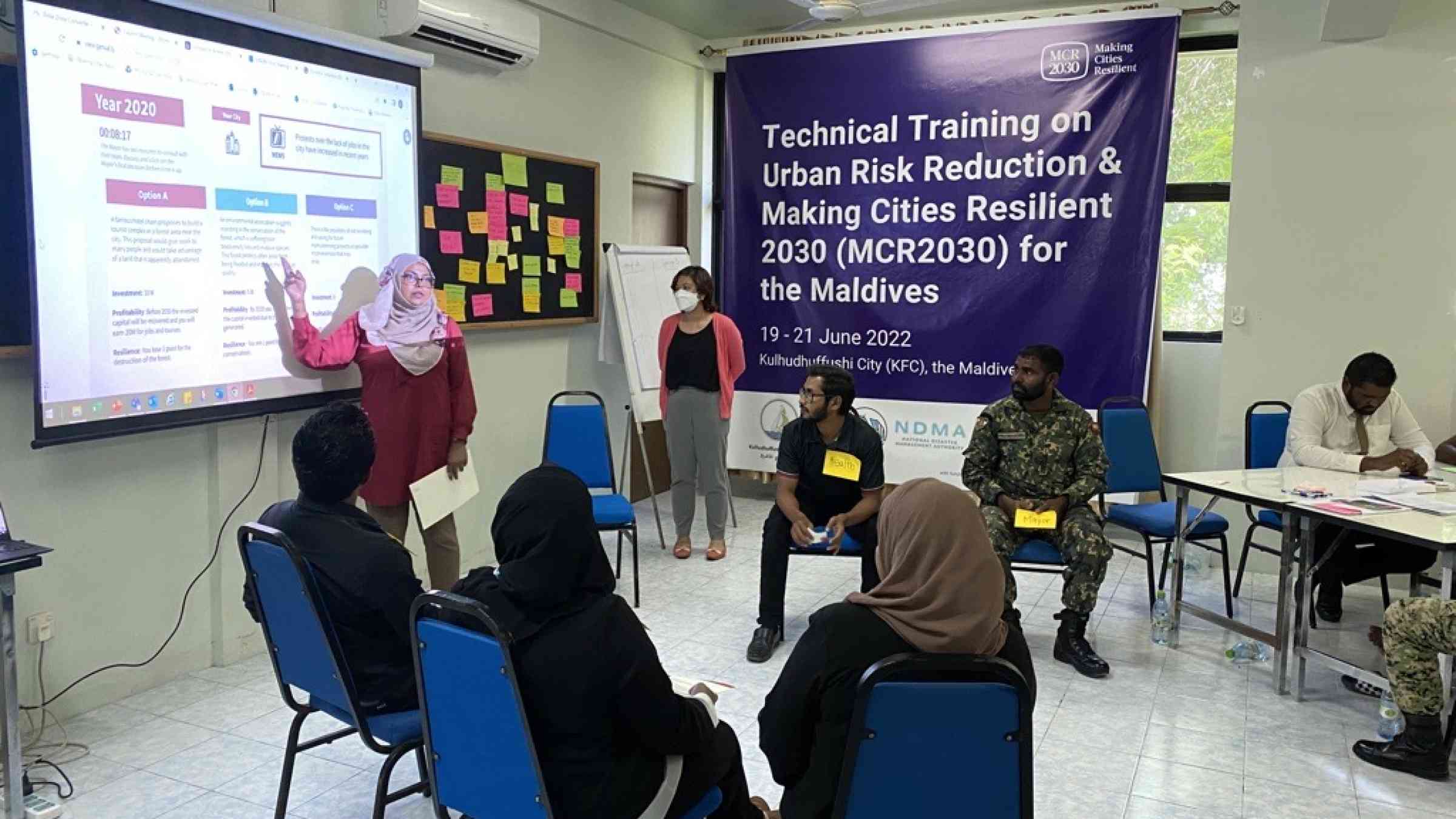Maldives launches MCR2030 on pathway to resilient cities

Kulhudhuffushi City has become the first municipality in the Maldives to join Making Cities Resilient 2030 (MCR2030).
The city signed up to the global initiative to strengthen climate and disaster resilience during a national training on the atoll nation in the Indian Ocean.
During the event, Kulhudhuffushi City representatives jointly prepared a draft disaster risk reduction action plan, which includes lead roles and timelines for actions.
“MCR2030 offers a platform for us to acquire knowledge and access networks, tools, resources, and services,” said Mr. Ali Ahmed, Deputy Mayor of Kulhudhuffushi City.
“I urge you all to actively become a part of this ambition to make our city more inclusive, safe, resilient, and sustainable by 2030. This will also help to achieve SDG11.”
Kulhudhuffushi City is currently on Stage B of the MCR2030 resilience roadmap, which signifies a need and readiness to strengthen planning and action to reduce disaster risk.
As a result of the training, Kulhudhuffushi City completed a baseline resilience assessment that identified capacities and gaps in current approaches to climate and disaster resilience.
Representatives used the tried and trusted Disaster Resilience Scorecard for Cities tool, which has been available online since May.
Mr. Hisan Hassan, Chief Executive of National Disaster Management Authority of Maldives (NDMA) highlighted the importance of taking a multi-sector and multi-level approach.
“We believe that disaster management should not be limited to one authority of the layers of government. In fact, we believe that disaster management is a whole of society effort,” he said.
The Local Government Authority (LGA) teamed up with the NDMA at the training to use MCR2030 as a means of supporting decentralized risk management and local resilience in the Maldives.
“We are eager to utilize the [MCR2030] network and its wide range of resources in implementing our mandate to develop the capacity of local councils and provide the trainings required to ensure decentralized administration in Maldives,” said LGA Advocater Hamdha Abdul Rahman.
Ms. Catherine Haswell, United Nations Resident Coordinator for the Maldives emphasized how global policy commitments can link to and drive local action.
“The purpose of this workshop is to bring the global tools like the Sendai Framework and Paris Agreement down to genuine local principles. With the support from UNDRR, I am sure that we can roll out MCR2030 to other cities in the Maldives,”
Participants completed and validated the preliminary level of disaster resilience assessment. They identified opportunities for improvement, in particular expediting recovery and building back better, strengthening institutional capacity, improving infrastructure resilience, as well as raising awareness of disaster risk across a wider range of stakeholders.
The experience of Kulhudhuffushi City provides a foundation for the national roll-out of the local resilience agenda in the Maldives and the need to consider decentralized risk management in the national planning.
“The close collaboration and commitment of NDMA and LGA as the lead national government agencies is vital to the success of localizing resilience in the Maldives,” said Mutarika Pruksapong, Programme Management Officer and Lead Trainer, of the United Nations Office for Disaster Risk Reduction (UNDRR).
“This workshop is only the beginning, and we encourage Kulhudhuffushi City, the NDMA and LGA to work closely together and showcase the experience to other cities around the world.”
The Maldives is spread across over 900 kilometers of the Indian Ocean and is home to more than 581,000 people. The island nation is one of the world’s most exposed and vulnerable countries in terms of the escalating negative impacts of climate change, such as rising sea levels and drought.
Forty-three representatives from 19 national and local agencies and entities, including local government councillors as well as representatives from ministries, schools, public infrastructure, and health facilities in the Maldives, participated in the event.
The three-day training was organized by UNDRR together with the NDMA and LGA.

